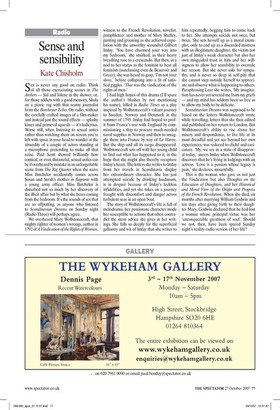Sense and sensibility
Kate Chisholm ex is never any good on radio. Think of all those excruciating scenes in The Archers — Sid and Jolene in the shower, or, for those addicts with a good memory, Shula on a picnic rug with that seamy journalist from the Borchester Echo. On radio, without the carefully crafted images of a film-maker and instead just the sound effects — splashy kisses and primeval squeals — it's ludicrous. Worse still, when listening to sexual antics rather than watching them on screen you're left with space in your head to wonder at the absurdity of a couple of actors standing at a microphone pretending to make all that noise. Paul Scott showed brilliantly how comical, or even distasteful, sexual antics can be if overheard by mistake in an unforgettable scene from The Raj Quartet when the naive Miss Batchelor accidentally comes across Susan and Sarah's mother in flagrante with a young army officer. Miss Batchelor is disturbed not so much by her discovery of the illicit affair but by what she hears coming from the bedroom. It's the sounds of sex that are so offputting, as anyone who listened to Scandinavian Dreams on Sunday night (Radio Three) will perhaps agree.
We overheard Mary Wollstonecraft, that mighty righter of women's wrongs, author in 1792 ofA Vindication of the Rights of Woman, witness to the French Revolution, novelist, pamphleteer and mother of Mary Shelley, panting and groaning as she achieved copulation with the unworthy scoundrel Gilbert Imlay. 'You have charmed your way into my bedroom,' she smirked, as their heavy breathing rose to a crescendo. But then, in a nod to her status as the feminist to beat all feminists (outclassing even de Beauvoir and Greer), she was heard to gasp, `I'm not your slave,' before collapsing into a fit of satisfied giggles. 'That was the vindication of the rights of men.'
I had high hopes of this drama (I'll spare the author's blushes by not mentioning his name), billed in Radio Times as a play inspired by Wollstonecraft's valiant journey to Sweden, Norway and Denmark in the summer of 1795. Imlay had hoped to profit from France's war with England by commissioning a ship to procure much-needed naval supplies in Norway and then to smuggle them into France by way of Le Havre. But the ship and all its cargo disappeared. Wollstonecraft sets off with her young child to find out what has happened to it, in the hope that she might also thereby recapture Imlay's heart. The letters she writes to Imlay from her travels in Scandinavia display her extraordinary character. She has just attempted suicide by drinking laudanum, is in despair because of Imlay's feckless infidelities, and yet she takes on a journey fraught with discomfort and danger across turbulent seas in an open boat.
The story of Wollstonecraft's life is full of melodrama; her passionate character made her susceptible to actions that often contradict the stern advice she gives in her writings. She falls so deeply for the superficial gallantry and wit of Imlay that she writes to him repeatedly, begging him to come back to her. She attempts suicide not once, but twice. She sets herself up as a moral exemplar, only to end up as a discarded mistress with an illegitimate daughter, the victim not just of Imlay's weak character but also her own misguided trust in him and her willingness to allow her sensibility to overrule her reason. But she never asks for sympathy, and is never so deep in self-pity that she cannot step outside herself to appreciate and observe what is happening to others. Paraphrasing Lear she writes, 'My imagination has never yet severed me from my griefs — and my mind has seldom been so free as to allow my body to be delicate.'
Scandinavian Dreams was supposed to be based on the letters Wollstonecraft wrote while travelling; letters that she then edited and published on her return to London. But Wollstonecraft's ability to rise above her misery and despondence, to live life at its most dreadful and yet see beyond her own experiences, was reduced to cliché and caricature. 'My, we are in a state of disapproval today,' sneers Imlay when Wollstonecraft discovers that he's living in lodgings with an actress. 'Love is a passion whose legacy is pain,' she declares, mournfully.
This is the woman who gave us not just the Vindication but also Thoughts on the Education of Daughters, and her Historical and Moral View of the Origin and Progress of the French Revolution. When she died, six months after marrying William Godwin and ten days after giving birth to their daughter Mary, Godwin declared that he had lost a woman whose principal virtue was her 'unconquerable greatness of soul'. Should we not, then, have been spared Sunday night's reality-radio version of her life?


































































 Previous page
Previous page